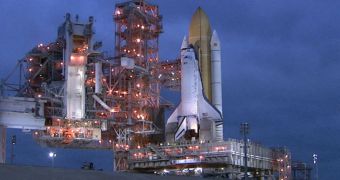This year's NASA flight manifest has the space shuttle Discovery flying to the International Space Station (ISS) at the beginning of next month, on April 5. But engineers at the Kennedy Space Center, in Florida, say that this date may be pushed back by a while, as they have discovered a leaky helium valve aboard the spacecraft. The finding is very important, as the valve is critical to the success of the STS-131 mission, to deliver a new logistics module, called Leonardo, as well as other supplies, equipment, fuel, food and water, Space reports.
What KSC engineers now need to figure out is whether the space shuttle can be brought within flight parameters in the short time they have left until the planned take-off date. Completing fueling operations is impossible without closing the valve, but spokespersons for the American space agency said that experts managed to complete the operations after locally shutting down the valve. “We physically, manually closed the isolation valves, so we know they work,” explained NASA spokesman, Allard Beutel. But the challenge ahead is not getting Discovery off the ground safely, but ensuring that the valves continue to function when the shuttle is in space.
The malfunction was detected during tests carried out on Friday, as NASA engineers were attempting to vent two of Discovery's thrusters, in order to make them ready for loading the propellant. At one point, after the venting was complete, sensors indicated that the pressure inside the thrusters was falling rapidly, suggesting either a leaky valve, or one that did not close at all. “Knowing whether the regulators are operating correctly is a key factor for managers who must decide whether to launch with the errant condition of the isolation valves,” NASA representatives said in a statement.
At this point, plans are to conduct thorough investigations of two helium system regulators, which are located further away from the valve itself. Engineers believe that doing this will better inform them on whether a more complex repair is needed for the faulty valve or not. If the situation is resolved in time, then Discovery will fly to the ISS, delivering the Multi-Purpose Logistics Module (MPLM) Leonardo, as well as other supplies. If not, then a possible delay would have a ripple effect on all three other launches that have been scheduled for this year.

 14 DAY TRIAL //
14 DAY TRIAL //